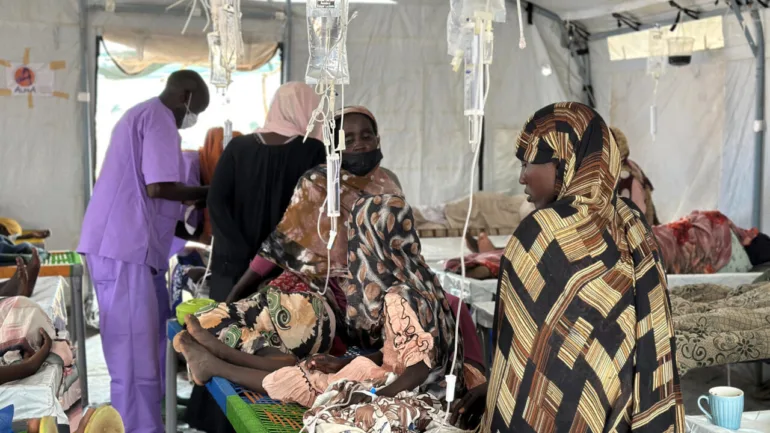Cholera has claimed at least 40 lives in Sudan’s Darfur region over the past week as the country grapples with its most severe outbreak in years, Doctors Without Borders (MSF) reported on Thursday.
At a cholera isolation tent in a Sudanese displacement camp, an AFP journalist witnessed women and a young girl receiving intravenous fluids, while exhausted and weak patients lay on camp beds.
Citing the rising cholera cases—which “exacerbate the worst effects of malnutrition”—the European Union (EU) urged all parties to “urgently” allow international aid to reach those in need.
Medical charity MSF said the vast western region, a major battleground for more than two years of fighting between the regular army and the paramilitary Rapid Support Forces (RSF), has been the hardest hit by the year-old outbreak.
“On top of an all-out war, people in Sudan are now facing the worst cholera outbreak the country has seen in years,” MSF said in a statement. “In the Darfur region alone, MSF teams treated over 2,300 patients and recorded 40 deaths in the past week.”
The NGO reported 2,470 cholera-related deaths between the start of the outbreak and August 11, out of 99,700 suspected cases.
Cholera is an acute intestinal infection caused by bacteria spread through food and water contaminated by feces. It leads to severe diarrhea, vomiting, and muscle cramps, and can be fatal within hours without treatment. However, it can be managed effectively with oral rehydration and antibiotics in severe cases.
Globally, cholera cases and geographic spread have increased since 2021. MSF said mass displacement caused by the war in Sudan has worsened the outbreak by cutting off access to clean water essential for hygiene, such as washing dishes and food.
The delivery of humanitarian aid has become nearly impossible.
“This cannot continue. Civilians must be protected, and humanitarian access must be granted,” the EU said in a joint statement with Britain, Canada, Japan, and other countries.
Crisis in Tawila
MSF highlighted Tawila in North Darfur state as the most extreme case, where 380,000 people have fled ongoing fighting near El-Fasher, according to the United Nations. There, people survive on an average of just three liters of water per day—less than half the emergency minimum of 7.5 liters per person required for drinking, cooking, and hygiene.
At a cholera isolation centre in a tent at a Tawila displacement camp, an AFP journalist met patients suffering from the outbreak. Mona Ibrahim, who has lived for two months in the hastily erected camp, said, “We mix lemon in the water when we have it and drink it as medicine. We have no other choice. We don’t have toilets—the children relieve themselves in the open.”
According to the World Health Organization, Sudan recorded the highest number of cholera deaths worldwide between January 2023 and July 2025. Sudan’s cholera mortality rate of 2.1 percent is more than 2.5 times the global average.
Contaminated water and ongoing conflict
Since the regular army recaptured Khartoum in March, fighting has shifted back to Darfur, where paramilitary forces have been attempting to take El-Fasher—the last major city in the region still under government control. UN agencies have described appalling conditions for civilians trapped inside.
“In displacement and refugee camps, families often have no choice but to drink from contaminated sources, leading to widespread cholera infections,” said Sylvain Penicaud, MSF project coordinator in Tawila. He added, “Just two weeks ago, a body was found in a well inside one of the camps. Although it was removed, within two days people were forced to drink from the same water again.”
Heavy rains have worsened the crisis by contaminating water supplies and damaging sewage systems. The ongoing displacement of civilians fleeing the fighting has accelerated the disease’s spread.
“As people move to escape the fighting, cholera is spreading further—both within Sudan and across borders into neighboring Chad and South Sudan,” MSF said.
Tuna Turkmen, MSF’s head of mission in Sudan, described the situation as “beyond urgent.” He warned, “The outbreak is now spreading well beyond displacement camps, affecting multiple localities across Darfur and beyond. Survivors of war must not be left to die from a preventable disease.”
AFP


